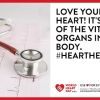Understanding the Stages of Heart Failure
What is Heart Failure?
Heart failure is a serious medical condition where the heart is unable to pump blood efficiently, leading to insufficient oxygen and nutrient delivery to various parts of the body. Contrary to popular belief, heart failure does not mean the heart stops working entirely but rather that its function is impaired. The heart’s ability to meet the body's demands is compromised, resulting in symptoms that can be managed but not cured in most cases.

How Heart Failure Develops
Heart failure typically progresses over time. It can develop gradually as the heart weakens due to a variety of causes such as high blood pressure, coronary artery disease, or previous heart attacks. The condition worsens as the heart becomes less effective at circulating blood, which can lead to severe complications if not managed properly.
Atlanta Heart Specialists
atlanta heart specialists
4375 Johns Creek Pkwy #350, Suwanee, GA 30024, USA

The Stages of Heart Failure
Stage A: High Risk for Heart Failure
In the earliest stage, known as Stage A, individuals may not show any symptoms of heart failure, but they are at high risk due to underlying conditions such as hypertension or a history of heart disease. During this stage, there is no noticeable damage to the heart’s ability to pump blood, but lifestyle changes such as a healthy diet, exercise, and medication to manage risk factors are recommended to prevent progression.
Stage B: Early Heart Failure
Stage B represents the beginning of heart failure. Though symptoms may not be present, there is clear evidence of structural heart damage. This might include a thickened heart wall, heart valve issues, or scarring from previous heart attacks. Individuals in Stage B may begin to experience shortness of breath or fatigue during physical exertion, but these symptoms are not constant. Medications, such as ACE inhibitors or beta-blockers, may be prescribed to help manage symptoms and slow down progression.
Stage C: Symptomatic Heart Failure
In Stage C, heart failure becomes symptomatic. Individuals will begin to experience persistent signs like shortness of breath, fatigue, swelling in the legs, and reduced ability to exercise. These symptoms are typically exacerbated by physical activity or even routine tasks. At this point, treatment usually involves a combination of medications, lifestyle modifications, and possibly surgical interventions such as the implantation of a pacemaker or defibrillator. A heart-healthy diet, fluid management, and close monitoring by healthcare providers become even more critical at this stage.
Stage D: Advanced Heart Failure
Stage D represents the most severe form of heart failure. Individuals in this stage experience debilitating symptoms even at rest. Fluid retention, severe shortness of breath, and difficulty performing daily tasks are common. At this stage, heart failure can become life-threatening, and patients may require more aggressive treatments, such as heart transplants, or long-term mechanical support through devices like ventricular assist devices (VADs). Palliative care may also become an option to manage symptoms and improve quality of life.
Causes of Heart Failure
Common Risk Factors
Several risk factors can contribute to the development and progression of heart failure, including:
- Coronary artery disease (CAD): A condition where the heart’s arteries become blocked or narrowed, leading to reduced blood flow.
- High blood pressure: Over time, hypertension can cause the heart to work harder, eventually leading to heart failure.
- Previous heart attack: Damaged heart tissue from a heart attack can impair the heart’s pumping ability.
- Valvular heart disease: Issues with heart valves can disrupt normal blood flow, leading to heart failure.
Understanding the Impact of Lifestyle Choices
While genetic factors play a role, lifestyle choices significantly influence the risk and progression of heart failure. Unhealthy habits, such as poor diet, lack of exercise, smoking, and excessive alcohol consumption, can exacerbate heart failure or even contribute to its development. Conversely, adopting a healthy lifestyle can reduce the risk of heart failure, especially in its early stages.
Treatment and Management of Heart Failure
Medications
Medications are a cornerstone of heart failure treatment, especially in the early to moderate stages. Drugs such as ACE inhibitors, beta-blockers, diuretics, and aldosterone antagonists help control symptoms, prevent the heart from working harder, and reduce fluid buildup in the body. Additionally, newer medications like SGLT2 inhibitors are showing promise in managing heart failure more effectively.
Lifestyle Changes
Incorporating lifestyle changes plays an important role in managing heart failure. A heart-healthy diet that’s low in sodium, regular physical activity tailored to individual capacity, stress management, and weight control are essential for improving outcomes. Regular follow-ups with healthcare providers and monitoring symptoms can help prevent exacerbations.
Surgical and Medical Devices
For more severe cases, patients may require surgical interventions, such as heart valve surgery or even heart transplants. Devices like pacemakers or implantable cardioverter defibrillators (ICDs) can also be used to regulate the heart’s rhythm and prevent dangerous arrhythmias.
Palliative and End-of-Life Care
In the final stages of heart failure, the focus often shifts to palliative care, which aims to alleviate pain and improve quality of life. This involves managing symptoms like shortness of breath, fatigue, and fluid retention, allowing patients to live as comfortably as possible.
Living with Heart Failure
Challenges and Support
Living with heart failure can be challenging, both physically and emotionally. Patients may struggle with fatigue, reduced independence, and the uncertainty of their condition’s progression. Support from family, friends, and healthcare providers is crucial in helping individuals manage their condition. Support groups and counseling can also provide valuable emotional support.
Real-Life Story: Coping with Heart Failure
One such story is that of John, a 58-year-old who was diagnosed with heart failure after years of untreated hypertension. Initially, John had no symptoms, but after experiencing shortness of breath during physical activity, he visited his doctor. He was placed on medication and encouraged to make lifestyle changes. Over time, with consistent treatment and regular checkups, John managed to keep his condition stable, allowing him to continue enjoying life with fewer limitations.
Conclusion
Heart failure is a complex and progressive condition that affects millions of people worldwide. Understanding its stages, symptoms, causes, and treatment options is essential for managing the disease effectively. Early diagnosis and proper management can make a significant difference in improving quality of life and reducing complications. If you or a loved one is at risk or living with heart failure, seek guidance from healthcare professionals to create a personalized treatment plan.





















Deborah Heart and Lung Center
deborah heart and lung center
200 Trenton Rd, Browns Mills, NJ 08015, USA